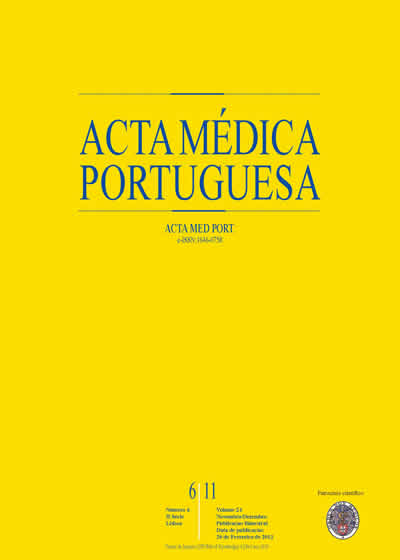Estágio de investigação em nutrição: relevância para a prática clínica em medicina.
DOI:
https://doi.org/10.20344/amp.1429Resumo
In oncology, early and individualized nutritional intervention for each patient is essential to improve nutritional intake and status, to reduce morbidity during treatment, enhance tolerance to treatment and improve Quality of Life.For medical students to evaluate nutritional risk and status, analyse the prevalence of undernutrition in a population of patients with diverse types of tumours. We aimed to identify difficulties regarding the use of the MUST tool (Malnutrition Universal Screening Tool) for nutritional risk by the students.This study included 35 cancer patients consecutively referenced for Radiotherapy (RT) in the Radiotherapy Department of the University Hospital of Santa Maria. Nutritional risk was evaluated by MUST; nutritional status by Patient Generated-Subjective Global Assessment (PG-SGA) validated and specific for oncology.Students identified 13 patients (36%) at moderate/high risk of undernutrition. According to PG-SGA, 31,5% (11/35) of patients presented moderate or severe undernutrition, of which 77% of patients needed individualized nutritional counselling. Students successfully detected undernourished patients using these specific methods.Risk of undernutrition and undernutrition are common in oncology, therefore indicating the critical need to educate all health professionals for risk screening and for the relevance of nutritional intervention in the multidisciplinary context. MUST is a simple and quick tool, that demonstrated to be adequate when applied by medical students, well accepted by these health professionals and effectively used. Nutritional risk evaluation can and must be performed by health professionals such as the medical team, as long as they are involved in patient's treatment. Our methodology may be used as a model allowing for early guidance to individualized intervention, human resources' optimization and education for the importance of nutrition care.Downloads
Downloads
Publicado
Como Citar
Edição
Secção
Licença
Todos os artigos publicados na AMP são de acesso aberto e cumprem os requisitos das agências de financiamento ou instituições académicas. Relativamente à utilização por terceiros a AMP rege-se pelos termos da licença Creative Commons ‘Atribuição – Uso Não-Comercial – (CC-BY-NC)’.
É da responsabilidade do autor obter permissão para reproduzir figuras, tabelas, etc., de outras publicações. Após a aceitação de um artigo, os autores serão convidados a preencher uma “Declaração de Responsabilidade Autoral e Partilha de Direitos de Autor “(http://www.actamedicaportuguesa.com/info/AMP-NormasPublicacao.pdf) e a “Declaração de Potenciais Conflitos de Interesse” (http://www.icmje.org/conflicts-of-interest) do ICMJE. Será enviado um e-mail ao autor correspondente, confirmando a receção do manuscrito.
Após a publicação, os autores ficam autorizados a disponibilizar os seus artigos em repositórios das suas instituições de origem, desde que mencionem sempre onde foram publicados e de acordo com a licença Creative Commons









